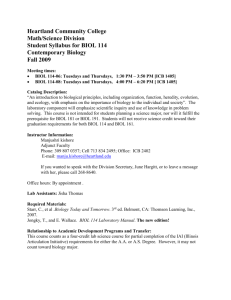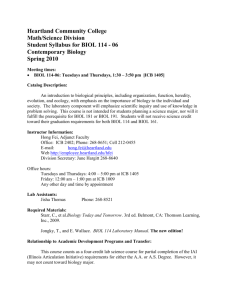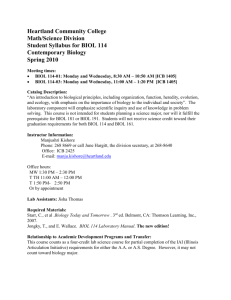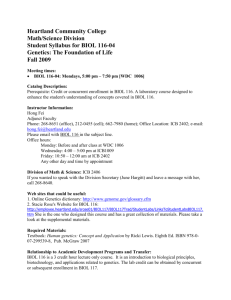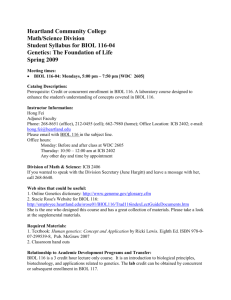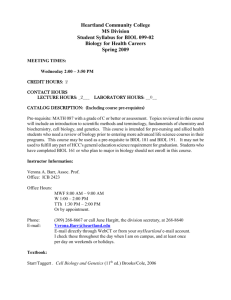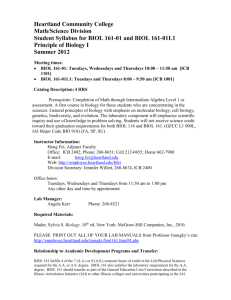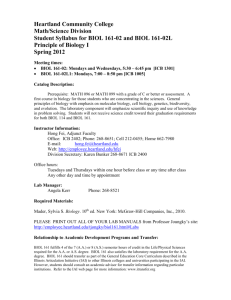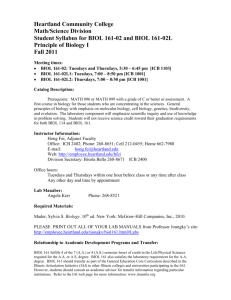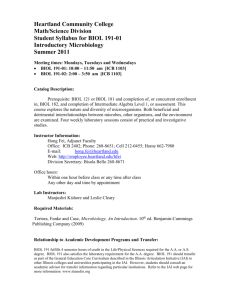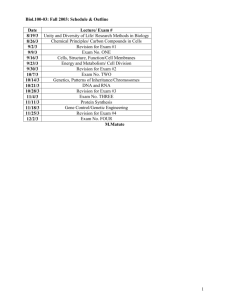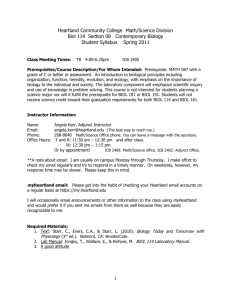BIO 114-H.Fei - Heartland Community College
advertisement
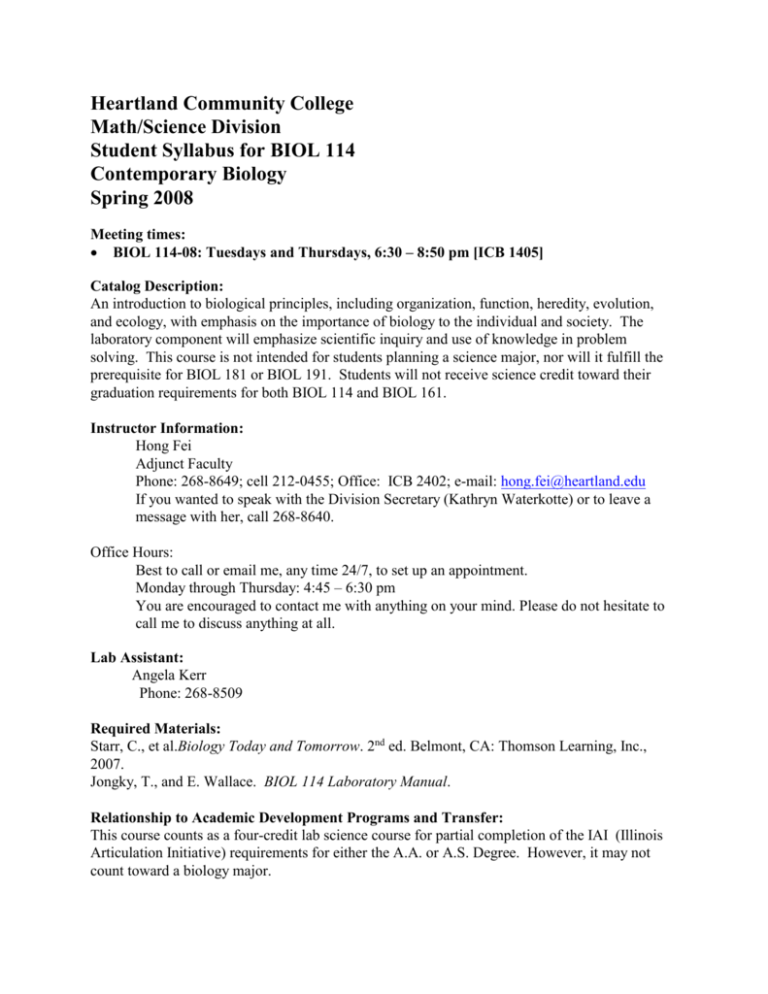
Heartland Community College Math/Science Division Student Syllabus for BIOL 114 Contemporary Biology Spring 2008 Meeting times: BIOL 114-08: Tuesdays and Thursdays, 6:30 – 8:50 pm [ICB 1405] Catalog Description: An introduction to biological principles, including organization, function, heredity, evolution, and ecology, with emphasis on the importance of biology to the individual and society. The laboratory component will emphasize scientific inquiry and use of knowledge in problem solving. This course is not intended for students planning a science major, nor will it fulfill the prerequisite for BIOL 181 or BIOL 191. Students will not receive science credit toward their graduation requirements for both BIOL 114 and BIOL 161. Instructor Information: Hong Fei Adjunct Faculty Phone: 268-8649; cell 212-0455; Office: ICB 2402; e-mail: hong.fei@heartland.edu If you wanted to speak with the Division Secretary (Kathryn Waterkotte) or to leave a message with her, call 268-8640. Office Hours: Best to call or email me, any time 24/7, to set up an appointment. Monday through Thursday: 4:45 – 6:30 pm You are encouraged to contact me with anything on your mind. Please do not hesitate to call me to discuss anything at all. Lab Assistant: Angela Kerr Phone: 268-8509 Required Materials: Starr, C., et al.Biology Today and Tomorrow. 2nd ed. Belmont, CA: Thomson Learning, Inc., 2007. Jongky, T., and E. Wallace. BIOL 114 Laboratory Manual. Relationship to Academic Development Programs and Transfer: This course counts as a four-credit lab science course for partial completion of the IAI (Illinois Articulation Initiative) requirements for either the A.A. or A.S. Degree. However, it may not count toward a biology major. Make-up policies 1. There are quiz make-ups. It will be in the test center (located in the library) only in the period of time between the quiz and the time next class meets. 2. There are NO make-ups for in-class activities. 3. There are NO lab make-ups. 4. There is NO make-up for the Journal Club. 5. The student will complete most labs before leaving class. If a lab assignment has to be finished outside of class, the assignment is due the next class day that the student comes to class. Only students who attend lab can finish the lab assignment. 6. In extreme cases (such as, documented severe illness, documented accident, or military duties) when a student must miss class for more than 2 weeks, the student must contact the instructor as soon as possible to discuss the best course of action. Incomplete Grade An Incomplete grade may be justified to a student if the student encounters extreme circumstances (e.g., serious illness, accident, death or serious illness in the immediate family) toward the end of the semester and is unable to complete the semester. The student must be in a position to pass the class if the Incomplete is given. The student must sign a form requiring him/her to finish the class by next semester. Required Writing and Reading Students must read the textbook to prepare for classroom activities. Students will write about biological news and answer questions on quizzes and labs. Academic Integrity Plagiarism is the presenting of others’ ideas as if they were your own. When you write a paper, create a project, do a presentation or create anything original, it is assumed that all the work, except for that which is attributed to another author or creator, is your own. Plagiarism is considered a serious academic offense and may take the following forms: Copying word-for-word from another source and not giving that source credit. Paraphrasing the work of another and not giving that source credit. Adopting a particularly apt phrase as your own. Using an image or a copy of an image without crediting its source. Paraphrasing someone else’s line of thinking in the development of a topic as if it were your own. Receiving excessive help from a friend or elsewhere, or using another project as if it were your own. [Adapted from the Modern Language Association’s MLA Handbook for Writers of Research Papers. New York: MLA, 1995: 26] Note that word-for-word copying is not the only form of plagiarism. The penalties for plagiarism may be severe, ranging from failure on the particular piece of work, failure in the course or expulsion from school in extreme cases. Academic Support Center Services http://www.heartland.edu/asc/ 1. Library The Library, located in the Student Commons Building at the Raab Road campus, provides Heartland students with a full range of resources including books, online journal databases, videos, newspapers, periodicals, reserves, and interlibrary loan. Librarians are available to assist in locating information. For more information please call the Library (309) 268-8200 or (309) 268-8292. http://www.heartland.edu/LIBRARY/index.html 2. Tutoring Services Heartland Community College offers tutoring in various forms at no cost to Heartland students at the Tutoring and Testing Center in Normal and at the Pontiac and Lincoln Centers. Tutors are available at convenient times throughout the week. Study groups are also available by request. For more information about services available at each location, please call the Tutoring and Testing Center in Normal at (309) 268-8231, the Pontiac Center at (815) 842-6777, or the Lincoln Center (217) 735-1731. http://www.heartland.edu/asc/tutor.html 3. Testing Services The Tutoring and Testing Center provides a secure testing environment for students who are enrolled in online, hybrid, and other distance learning courses; have a documented disability; or need to take a make-up exam. Testing accommodations for students having documented disabilities must be arranged by the student through the Office of Disability Services, and Testing Services will only administer make-up exams at the request of the instructor. Contact Testing Services at (309) 268-8231 for more information. http://www.heartland.edu/asc/testing.html 4. Open Computing Lab The Open Computing Lab provides free computing for HCC students at convenient times throughout the week. The computer lab is staffed by trained Lab Assistants and offers the use of approximately 70 computers, a scanner, a laser printer, and an electric typewriter. http://www.heartland.edu/asc/computerlab.html Documented disability If you have a documented disability and wish to discuss academic accommodations, please contact Anita Moore at 268-8249 or anita.moore@heartland.edu **Notice of Cancelled Class Sessions** Cancelled class sessions, for all HCC classes, will be listed under Cancelled Class Meetings in the A-Z Index and under Academic Information in the Current Students page on the HCC Web site. Go to http://www.heartland.edu/classCancellations/ to learn what classes have been cancelled for that day and the upcoming week. Be sure to check the last column, which might contain a message from the instructor. Tentative Schedule for Bio 114 Course Objectives: Upon successful completion of this course, students will be able to fulfill the following tasks. 1. Presented with hypothetical problems, using scientific method to propose testable hypothesis, methods of study, experimental design and methods of data analysis. 2. Presented with hypothetical experimental results, propose possible conclusions and offering critiques aimed at conclusions. 3. Identify the differences in prokaryotes and eukaryotes; and apply these differences in the use of antibiotics, tools in drug discoveries and health. 4. Identify routes in oncogene product actions and identify steps in mitosis that can be disrupted in cancer. 5. Using Mendel's Laws and knowledge about meiosis, identify out come of possible progeny from N different loci, which is the basis of genetic fingerprinting. 6. Comparing current genotyping methods identify advantages and disadvantages of the methods in forensics and in disease screening. 7. State your view for or against prenatal genotyping for screening of genetic disorders with at least two cause / effect reasons. 8. Given experimental data of phenotype distributions, judge if the closed population is evolving or at the equilibrium. 9. Identify basic structures and functions of three organ systems (among the eight systems) circulatory, digestive and skeletal systems. 10. Using the body temperature regulation as example, identify components in a typical negative feedback regulatory pathway that maintains the homeostasis. 11. Identify factors in baroreceptor pathways that affect heart rate and blood pressure during exercises. 12. Identify factors in the energy homeostasis regulatory pathway and mechanism of keeping the body's energy homeostasis. Week 1, January 14 Unit 1 - Cells: Scientific Methods Biochemistry of amino acids, carbohydrates, nucleic acids and protein Lab 1: Scientific Method Week 2, January 21 Unit 1 - Cells: Journal Club 1, 2 Basic unit of life - the cell Comparing prokaryotes and eukaryotes Lab 2: Microscope Lab 3: Observing Life Week 3, January 28 Quiz for unit 1 Unit 2 - Genetics: Mitosis and meiosis; simulation of mitosis and meiosis Lab 4: Cells Week 4, February 4 Unit 2 - Genetics: Cell cycle and regulation Lab 5: Mitosis Week 5, February 11 Unit 2 - Genetics: Human genetics - problems and pedigree Lab 6: Human Sexual Reproduction Week 6, February 18 Unit 2 - Genetics: Journal Club 3, 4 Molecular genetics: DNA replication, restriction analysis, sequencing, DNA fingerprint, the genome and ethic implications Lab 7: Genetics Week 7, February 25 Unit 2 - Genetics: Journal Club 5, 6, 7 Molecular genetics: Gene expression, functional genome Lab 8: Extracting DNA Week 8, March 3 Unit 2 - Genetics: Lab 9: Protein synthesis Gene Expression: Transcription and translation - Synthesis of RNA and protein Quiz for unit 2 MARCH 10 - 15: SPRING BREAK, NO CLASS Week 9, March 17 Unit 3 - Physiology: The Digestive System Lab 10: Nutrition and Digestive System Lab 11: Enzymes Week 10, March 24 Unit 3 - Physiology: The Skeletal System Lab 12: Skeletal System Week 11, March 31 Unit 3 - Physiology: The circulatory system Lab 13: Circulatory system Week 12, April 7 Unit 3 - Physiology: The Nervous System Lab 14: Senses and Reflexes Week 13, April 14 Quiz for unit 3 Unit 4 - Evolution and Classification Lab 15: Natural Selection Week 14, April 21 Unit 4 - Evolution and Classification Activities about evolution replacing the lab 16 Week 15, April 28 Quiz for Unit 4 Unit 5 - Microbiology, Ecology Lab 17: Bacteria Week 16, May 5 Unit 5 - Microbiology, Ecology Lab 18: Protists and Fungi Quiz for unit 5 The Final Week Review Final Exam May 15 Grade Calculation: Each unit quiz = 100 points Total points possible for the quizzes = 500 points (61%) Journal Club presentation = 100 points (13%) *During the semester, five or more journal articles will be distributed for presentation and discussion. The presentation and discussion will be graded. Each lab report = 10 points Total points possible for the lab part = 170 points (22%) Attendance = 30 points (4%) Total points possible = 800 points Total points will be converted into a 100% scale. Example: If you got a total points of 400 from the quizzes and 130 points from the lab reports, 90 points from the presentation and 30 points from attendance, your total points earned = (400 + 130 + 90 + 30) = 650; Your final grade = 650 x 100/800 = 82 Final Grade: A = 90+ B = 80+ C = 70+ D = 60+ F = 60- The Journal Club In biology, we encounter a lot of facts, concepts and theories. It makes little sense to memorize facts without understanding how they were discovered and why the theories are correct. It is important that at the college level, students read and present articles from original, peer reviewed journals and understand them as the recognized source of information for scientists or scientific community at large. 1. Objectives Students will gain insight to the process of scientific inquiries. 2. Procedure: At the beginning of unit 2, you will receive a series of scientific journal articles that are simplified version of historical (Nobel Prize winning) discoveries. Because they are all discoveries that revolutionized biotechnology and medicine, they will give you ideas of "how" and "why" behind theories. Because they are simplified, technical details are avoided. All students will be given articles to read. However, each group of students will have an article to present. They will present to the class the following aspects of the article. 1) Why the research was done? What problem they hoped to solve? What background work had been done? 2) Describe the methods. Why did they choose this particular method? What was the break through in this methodology? 3) Explain the results. If there are data, tables, or figures, you are expected to explain them to the audience. You should show the data as if you were presenting them to the scientific community, using visual aids. 4) What were the conclusions? What was the significance of this work? Are there potential applications in research and medicine? 5) Critique the research. What is the next step if you were the one who finished the study? 3. Evaluation Students are encouraged to discuss with instructor before the presentation. Total point of 100 can be earned towards the final grade. Presentation: Concise and accurate 20% Content: Include the above aspects 60% Discussion: Answering questions from audience 20% Safety Rules for Biology Lab 1. Emergency shower and emergency eye wash are located at the side of classroom. 2. Fire extinguisher is located in the classroom. Familiarize yourself with the location. 3. Safety information about chemicals used in labs, including chemical storage, poison control and treatment, is on file and available on my desk in binder. These papers are called Material Safety Data Sheets (MSDS) that are required by law to be available for inspection by users. 4. Eye protection, gloves, aprons will be provided when exercise necessities; however, they are available at all times upon request. 5. Always ware gloves when handling chemicals. 6. Dispose hazardous material in special containers. 7. Dispose sharps (needles, blades) in sharp container. 8. Dispose bacteria culture in biohazard bags. 9. Rinse with copious amount of water when chemicals spilled on skin. 10. Handling vaporous material in fume hood. 11. Clean up work area so next time or next person will not touch chemicals or microbes. 12. Report accident immediately. Ways to Succeed in School 1. Get to class on time. Bring books, pen and class notes. 2. Study at the library for 1 hour every day. a. b. c. d. e. f. 3. Not comfy chairs Book flat on the table Feet flat on the floor Back straight No cell phone No food Often times, failure reflects poor communication rather than intelligence. When trouble comes, TALK TO ME!!!
